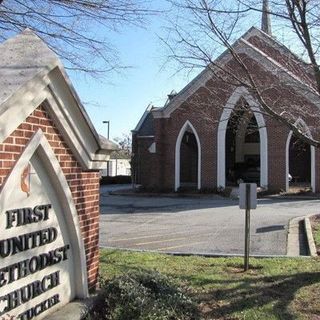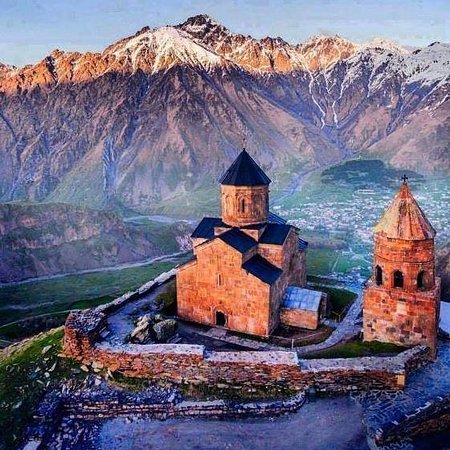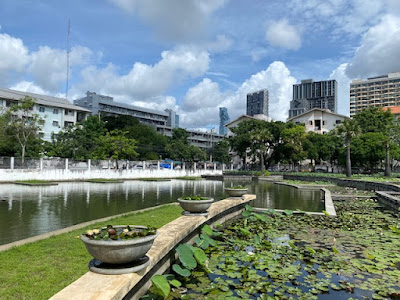My morning laziness led to a painful internal confrontation about work and money and the meaning of life and salvation and all that...
It was unsettling, so I thought I'd write it down so I can stop thinking about it.
In a slow, situational-depression-influenced cascade of poor decisions, my sleep cycle is currently in a state of disruption.
Thus, my very well-meaning plan of going to the 7:30 am service at the church near my apartment became a plan to go to the 10 am service, which became a plan to watch a live streamed service at home.
Since I'm in Bangkok, Sunday morning in the U.S. hadn't happened yet, so I decided to watch an old recording - literally the first result that popped up on my TV's YouTube app when I searched "UMC service." I didn't think too much, just wanted something familiar and easy.
It turned out to be this: TuckerFirst UMC Traditional Service 09/05/2021.
 |
| It's cute. |
It was a bit strange to hear the outdated announcements about people and a community I didn't know and wasn't a part of (I looked it up - the church is in a suburb of Atlanta, Georgia). As the date indicates, it was Labor Day weekend, and the sermon was related to, you guessed it, labor.
The U.S. Department of Labor writes that "Labor Day is an annual celebration of the social and economic achievements of American workers. The holiday is rooted in the late nineteenth century, when labor activists pushed for a federal holiday to recognize the many contributions workers have made to America’s strength, prosperity, and well-being."
Very nice.
The workers' movements, union fights, communism vs. capitalism, Karl Marx debates feel long resolved. Now, when we talk about socialism in the U.S., it's mainly as a dog whistle for Bernie Sanders, AOC, and their ilk, with conservatives fearing that socialism will mean government control of everything and having to give away their hard earned money to undeserving lazy, poors. As Fukuyama explained in 1989, capitalism has won, communism has lost, and the liberal democratic world order has been solidly established as the superior model, which will only grow and spread until all the world is at peace within an interconnected global economy. Right??
But I, as a (wannabe) Sovietologist who maybe wishes she were born into the political climate of the early Cold War rather than the War on Terror, know better. I know the history of the October Revolution, the rise and evolution of Marxism and Leninism, the hopeful ideals of early communist thinking. I've marveled at the dreamscape art of the Russian avant-garde communist futurism movement, and the farmer and factory worker idealized through socialist realism.
 |
| I have a poster very similar to this hanging in the study of my Tbilisi apartment |
Want to revel in this with me for a moment?
Statues that glorify workers and mothers
Very cool online gallery of socialist realism, even with pieces for sale!
“Down with Kitchen Slavery! Yes to a new way of life!” Poster - 1931
Liberation from kitchen slavery, poster
Some cool, weird Soviet Jetsons designs in here
Some of that design was even, eventually, realized
-------------------------------------------------------
Of course, the whole underpinning of the overthrow of the Russian empire and the formation of the Soviet Union was based on the Marxist principle that the proletariat (the laborers) should own the means of production, rather than the bourgeoisie.
While studying this idea in university, I wasn't totally sure what side of the dialectic I was on. In modern society, it's much harder to identify the "means of production" in the same clear way that Marx could. An entrepreneur can make millions with just a computer. Is the "means" in this case the common laptop? An education? Capital? Staff? Artists and creators can produce and share and sell their work all over the world through the internet. In intellectual, office work, are people themselves the means of production? Who owns the workers?
If you own a business and employ someone, does that make you part of the bourgeoisie? If you have a job, are you part of the proletariat, or must it be manual labor? We no longer live in a society based on feudal principles. No longer is there a strict dichotomy between a toiling lower class and an aristocratic upper class that earns passive rent and profit on that labor, spending their time pontificating on philosophy and creating art.
I'm sure these questions have been asked and studied and talked and written to death in modern scholarship, but I pretty much stopped following the history of labor and communist theory after the Soviet Union fell apart in 1991 - Fukuyama got me good. It was even a comforting thought that the struggle was over, the Clash of Civilizations had been resolved. It was our (wealthy white westerners) job now to spread the gospel of liberal democracy and the invisible hand to the less enlightened corners of the world. Prosperity will come through economic and social development, which is only hampered by corrupt, militaristic dictators who hold their people down for selfish personal gain, which perhaps justifies assassinations and propagandistic manipulation, and nation toppling and nation building. And maybe that's true. To a degree, I believe it myself, but I also feel a profound, unsatisfying emptiness in it all.
 |
| Demolition of Christ the Savior Cathedral in Moscow, 1931 (They turned it into an awesome outdoor public swimming pool, then rebuilt the church in 2000. In 2012 Pussy Riot sang their "Punk Prayer" on the alter, and in 2013 they wouldn't let me in because my dress was too short...) |
 |
| very cool me circa 2013...I still have this dress... |
That's part of why I am spiritual - it gives me peace to recognize that there is a massive, cosmic mystery that it's impossible to understand completely. It's okay that we don't have the answers. Of course life is unsatisfying - it's not the end, not the goal. So at some point in my teen years I decided that the only thing that mattered in life was love - in all its forms and all its verbiage (give, receive, show, spread), and my purpose was to try and alleviate others' suffering as much as I can. And striving for that purpose will give this life meaning.
This brings me back to the labor day sermon.
It's based on the gospel passage of Jesus and the 'rich young ruler/man' - this is where Jesus utters that famous (and always, for me, horrifying) phrase "it is easier for a camel to pass through the eye of a needle than for a rich man to enter the Kingdom of Heaven."
You can listen to it here, but if you're impatient like me, I paraphrased her excellent sermon below:
- The word "weekend" appeared in the English common vernacular in 1879 - less than 150 years ago
- Before that, people more or less worked everyday, with the occasional Sunday off for church
- But people kept coming to work hungover, or calling out sick on Monday, so English factories expanded to a half-Saturday off as well
- Then, a mill in New England wanted to be fair to their Jewish employees so let everyone off all day Saturday and all day Sunday
(A lot of the research seems to have come from this Atlantic article)
- In 1938, the Fair Labor Standards Act cemented the two-day weekend into law in the US (it also instituted a minimum wage, limited child labor, and required overtime pay)
- In 1928, economist John Maynard Keynes wrote that technological advancement would bring the workweek down to 15 hours within 100 years
- A 1965 Senate subcommittee predicted Americans would work 14-hour weeks by the year 2000 (lol)
- So, what happened? There are a few theories...
- 1) Instead of taking time off, we starting buying more stuff, as in the ~1960s new corporate marketing techniques convinced Americans to covet things they never saw as essential before, which required more money, and thus more hours, even as pay for those hours increased
- 2) Instead of taking time off, work itself became idealized - phrases like "the protestant work ethic," and "the American dream," emphasize that working long, hard hours is part of what it takes to be a morally upstanding citizen. Grind culture is a thing - it is admirable and advantageous to be constantly working, on, and available, being the first one in and last one to leave.
- Surely, hard work is a virtue, but working for what?
- "Is working hard at winning at hard work worth working for?"
- She summarizes the gospel passage:
17 As He was setting out on a journey, a man ran up to Him and knelt before Him, and asked Him, “Good Teacher, what shall I do so that I may inherit eternal life?” 18 But Jesus said to him, “Why do you call Me good? No one is good except God alone. 19 You know the commandments: ‘Do not murder, Do not commit adultery, Do not steal, Do not give false testimony, Do not defraud, Honor your father and mother.’” 20 And he said to Him, “Teacher, I have kept all these things from my youth.” 21 Looking at him, Jesus showed love to him and said to him, “One thing you lack: go and sell all you possess and give to the poor, and you will have treasure in heaven; and come, follow Me.” 22 But he [a]was deeply dismayed by [b]these words, and he went away grieving; for he was one who owned much property.
23 And Jesus, looking around, *said to His disciples, “How hard it will be for those who are wealthy to enter the kingdom of God!” 24 And the disciples were amazed at His words. But Jesus responded again and *said to them, “Children, how hard it is to enter the kingdom of God! 25 It is easier for a camel to go through the eye of a needle than for a rich person to enter the kingdom of God.” 26 And they were even more astonished, and said to Him, “[c]Then who can be saved?” 27 Looking at them, Jesus *said, “With people it is impossible, but not with God; for all things are possible with God.”
- She emphasizes a few things from the passage:
- Jesus repeats not all the commandments, but the ones that are about human relationships, about how we treat one another - though he changes 'do not covet' to 'do not defraud' - maybe a subtle reference to this guy's wealth?
- When Jesus is about to drop the bomb, he "looked at the man and loved him" - he didn't call him greedy, or a capitalist pig, he didn't look at him with righteous indignation or moral superiority. Jesus understood how hard this was. We love our stuff; it gives us a sense of security.
- This was a shocking teaching for the disciples, and it should be shocking to us today.
- Surely Jesus doesn't mean all our possessions, right? We need our houses and cars and 401Ks. Surely this is a metaphor, right? Maybe...or maybe not. Certainly people like Saint Francis and Mother Theresa took it literally.
- This was a shocking teaching also because in Jesus' time, wealth was looked at as a blessing, as a sign that God favored you, that you were worthy of respect - it's not so different today.
Of course, we know that Jesus was a social justice warrior, an anarchist, a disrupter of the social and economic order. But still, damn. To think just how radical that suggestion was - to give up everything and embrace poverty, rather than chasing even the little comfort that could be afforded to the working poor at that time and place? Wild.
Okay, back to the sermon. Here's the upshot.
- The disciples aren't feeling it. They already abandoned their families and possessions to follow and serve Jesus, and they want to be sure that they will be saved. But instead of reassuring them, Jesus says, essentially, no mortal can save themselves, but they can only be saved by God.
- Then she talks about *grace*, which is beautiful, but not really to the point of my ruminations on labor and wealth and duty...
- She quotes a colleague, who said something lovely inspired by van Gogh: "Work isn't successful because of an outcome, work is successful if it glorifies God."
- Grace frees us to work for beauty and justice and connection to the holy instead of just working for ourselves.
 |
| Gergeti Sameba - could I live here? |
There have always been richer societies and poorer societies, but globalization has helped shift the divide of rich and poor, upper class and lower class, from being one that cuts across each society, each country, to one that cuts across the world, dividing global north from global south.
 |
The Atlantic article on the 5-day work week linked above notes that "The Great Depression cemented the two-day weekend into the economy, as shorter hours were considered a remedy to underemployment." - further shortening work hours could be a remedy to anticipated future under-/unemployment brought about by automation. It's certainly not a novel concept.
Keynes and Congress envisioned a world with less work. What happened? Why didn't the progress in lightening and shortening labor continue? If there a fear that if we work less, we will be worth less? Do we not otherwise know how to value ourselves? Or will we fill the free time we gain with more love and beauty? Better distribute the bounty of an increasingly productive global economy among the strata of society? Or will we simply consume more - media, things - without really creating much of value? Will we spend all our time in the meta verse (which apparently smells like communist propaganda)?
Maybe COVID's transition to remote work flexibilities for office workers is the jumpstart the movement needs to continue to progress. Although the real need, from the perspective of labor rights, is not fewer hours for office drones like me, but fairer practices for the laborers of the world who still do very much toil in factories and fields. Perhaps a better person than me would spend more time and energy fighting for those causes, lifting up the downtrodden.
When I decided that the only good way to spend a life was spreading love and alleviating suffering, in the service of others, I saw two options: earn money and give it away to those in need, or commit my career to working in the systems that help those in need. That's how I ended up at USAID. As I like to think of it - spending the tax dollars of the richest country in the world to make life better for the poorest in the world. The truth is, however, moral licensing in this profession is prevalent and powerful. Even after a week of nothing but spreadsheets during the day and takeout at night in front of my HD TV in my government-provided apartment, I feel a poorly earned sense of satisfaction, of having done something worthwhile, that seems to lift the daily responsibility of service in real time. Every time I pass a beggar and don't drop a coin, or think about how much money to put in the plate at church and choose the lesser value, I soothe my own guilt by thinking - but my job is worthwhile. Even though, honestly, I seriously doubt the worth of my contributions to the behemoth that is the international aid and development industry. Perhaps Tolstoy got it right all along...
 |
| Tolstoy's grave at Yasnaya Polyana |
"The less importance he attached to the opinion of men the more did he feel the presence of God within him. " - Father Sergius eventually comes to realize.
Peter Singer, the philosopher whom I first encountered in a mind blowing undergrad class called "Global Ethics," who wrote the moving theoretical essay "The Life You Can Save" that popularized Mother Theresa's quote "give until it hurts" in the frame of charitable donations, is worth $9 mil (according to this potentially very unreliable website).
Knowing the right thing to do doesn't make it easier. In fact, it might even make it harder, because feeling that you have decoded something about life and the world and humanity and good and evil and justice and morality is such an achievement in itself that, in a way, you feel that it might be enough, at least for now. Action can come later.
All this thinking makes me realize how much I don't know...all the conversations and debates and scholarship that are happening that I am not at all aware of. Almost makes me want to go back to school! Then I remember that I am too old, it would be embarrassing to compare myself to the other students, and if I want to keep up with the Joneses, I need to make money, so anyway...Happy early Labor Day!
 |
| Soviet mural in Ulan-Ude, Buryatia, Russia |
















